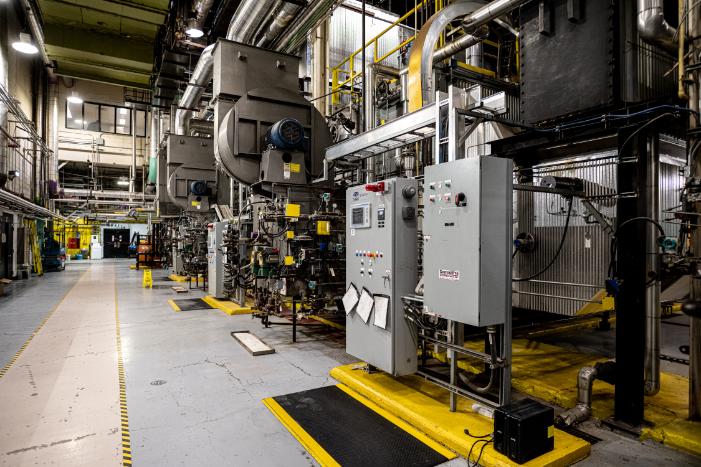Electric Boiler Project

Memorial University, with the Department of Facilities Management, will replace one of its fuel-fired steam boilers with electric powered steam boilers.
Memorial University has four 18MW fuel-fired water tube steam boilers in the Utilities Annex. These boilers provide high temperature hot water for heating systems and steam to the Health Science Centre (HSC) complex and many of the university buildings on the St. John’s campus. One of these boilers is currently not in operation and will be replaced with two smaller electric powered steam boilers. This will allow the university to use electric power to provide heat and drastically reduce fossil fuel usage at the Utilities Annex. The conversion will not impact the redundancy required for heating the Health Science Centre (HSC).
Importance/benefits of conversion to the university.
Memorial is committed to reduce the institution’s carbon foot print. This is a huge step forward. Beyond the environmental benefits of utilizing green energy, the future costs of electricity are reasonably predictable as opposed to the fluctuating price of fuel oil. This project will allow the university to better predict its future energy costs.
What is heated by the annex?
As part of the Department of Facilitites Management, the Utilities Annex distributes high temperature hot water (for heating) and steam. The heating water generated by the boilers provides heat to the entire HSC complex which includes the main hospital, the Janeway, the new Molecular Imaging Centre, Faculty of Medicine, Animal Resource Centre and it will also heat the new Adult Mental Health and Addictions Facility. The heating water from the annex also provides heat to the National Research Council (NRC) complex.
While most Memorial buildings on the St. John’s campus have a combination of heating, the primary source for all academic south campus buildings (between the parkway and Elizabeth Avenue) comes from the boilers in the annex. On north campus, all buildings west of the School of Business including the new Core Science Facility have some form of Utility Annex heating.
The boilers also generate steam used for humidification and sterilization at the HSC. The heating water also provides domestic hot water at the HSC. Other than what is required to keep essential services running within the building during outages, the Utilities Annex does not generate power.
Necessity of maintaining combination of electric fuel and fired boilers
Memorial uses boilers to supply steam, water for heating systems and domestic hot water to the HSC complex and by code Memorial must maintain these services in the event of a power outage. As such, some fuel-fired boilers at the Utilities Annex must remain active. It is anticipated the existing fuel-fired boilers would be used during extenuating circumstances, when the electric boilers are offline for maintenance/repair, or when demand may exceed the capacity of the electric boilers. There may also be situations where the electrical utility will request Memorial to reduce system load by reducing or stopping use of the electric boilers due to capacity limitations on the grid during peak demand events. It is anticipated that fossil fuel consumption will be reduced by between 80 and 85%.
Quick facts:
- Anticipated liters of fuel saved with conversion: 10.5M litres
- Greenhouse gas reduction figures: 28440 Tons of CO2 TGHG (approx.)
- Equivalent cars off the road (or other comparators): 6200
- Reduction in CO2 emissions equivalent to charging 3,459,760,151 smartphones or energy use for 3425 homes for one year
Below is a video tour of the Ultities Annex.